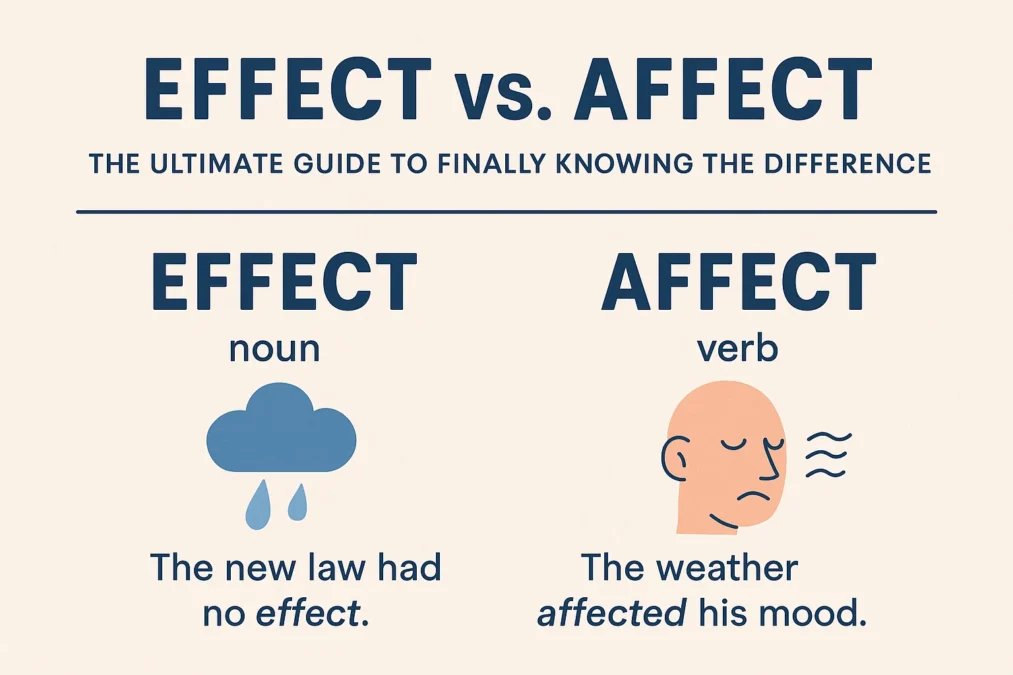You’re typing along, confident in your message, when you hit a grammatical speed bump. You pause, your fingers hovering over the keyboard. Is it “effect” or “affect”? You’re not alone. This pair of words is one of the most common sources of confusion in the English language, tripping up everyone from students to seasoned professionals. They sound similar, look similar, and both deal with change and consequence, making them easy to mix up. But the truth is, the distinction between effect and affect is quite clear once you understand the core concept behind each one.
Mastering the difference between these two words is more than just a grammatical flex; it’s a crucial tool for clear and effective communication. Using the wrong word can muddy your meaning, distract your reader, and even undermine your credibility. This comprehensive guide is designed to be your go-to resource, transforming this common point of confusion into a point of confidence. We will dive deep into the definitions, explore the nuances, provide countless examples, and equip you with simple, foolproof tricks to ensure you always choose the right word. So, let’s settle this once and for all and banish the effect vs affect anxiety for good.
Unlocking the Core Concept: The Simple Rule of Thumb
Before we get into the exceptions and advanced usage, let’s start with the foundational rule that will guide you in 95% of situations. The simplest way to remember the difference is to think of affect as an action and effect as the end result. Affect is almost always a verb, meaning to influence or change something. Effect is almost always a noun, meaning the result or consequence of a change. This primary distinction is the golden key that unlocks most of the confusion.
When you are describing the act of influencing something, you want affect. Think of the ‘A’ in affect standing for “action.” For example, “The rainy weather can affect your mood.” Here, the weather is acting upon, or influencing, your mood. On the other side, when you are talking about the outcome or the result that occurred, you want effect. Think of the ‘E’ in effect standing for “end result.” For example, “The effect of the rainy weather was a somber mood.” In this case, the somber mood is the result, the consequence, of the rainy weather.
Cementing the Basic Idea with Everyday Examples
Let’s solidify this basic rule with a few more straightforward examples. Imagine a scientist conducting an experiment. She wants to see how a new fertilizer affects plant growth. The verb “affects” is correct here because she is talking about the action of the fertilizer influencing the growth. After the experiment, she observes that the fertilizer had a significant effect on the plants, causing them to double in size. The noun “effect” is correct here because it refers to the result—the doubled size—of the fertilizer’s action.
Consider a social media post. A controversial tweet from a celebrity can affect public opinion. The action of the tweet influences what people think. The effect of that tweet might be a widespread online debate. The debate is the resulting outcome. In your personal life, getting a good night’s sleep can positively affect your productivity the next day. The action of sleeping influences your productivity. The positive effect is that you get more work done with greater focus. This cause-and-effect relationship is at the very heart of the distinction.
Diving Deeper into Affect: The Action Verb
Now that we have the overarching principle, let’s zoom in on affect. As we’ve established, its most common role is as a transitive verb, which means it needs a direct object—it acts upon something. You can’t just say “The weather affects.” You need to say what it affects: “The weather affects my plans.” The plans are the object being acted upon. The core meaning is to produce a change in something. This change can be physical, emotional, or situational.
The verb affect can be used in a wide range of contexts, from the scientific to the emotional. In medicine, a stroke can affect the brain’s ability to process language. In economics, interest rates affect the housing market. In psychology, a parent’s praise can affect a child’s self-esteem. The common thread is always influence and change. It’s about the process, the action, the cause that sets things in motion.
The Nuances of the Verb Affect
While “to influence” is the primary meaning, the verb affect can carry slightly different shades of meaning depending on the context. It often implies a change that is significant enough to be noticed. For instance, “The new policy did not affect the company’s bottom line” suggests that the policy had no measurable or meaningful impact. It can also carry a connotation of acting upon the emotions, as in, “The tragic story deeply affected everyone who heard it.”
Another subtle use of affect is to mean “to pretend to have or feel something.” For example, “He affected a British accent to seem more sophisticated.” Or, “She affected an interest in classical music to impress her date.” In this sense, it’s about putting on a false show or adopting a mannerism that isn’t genuine. This usage is less common but still important to recognize, as it highlights the idea of an action—in this case, the act of pretending. However, for the vast majority of your writing, you will be using affect in its “to influence” sense.
Exploring Effect: The Result Noun
Shifting our focus to effect, we find its stronghold as a noun. This word represents the change that has been brought about. It is the destination, while affect is the journey. When you see “the,” “an,” or “any” before the word, you are almost certainly dealing with the noun effect. It answers the question “What happened as a result?” The noun effect can be qualified in many ways; it can be a significant effect, a negligible effect, a domino effect, or a ripple effect.
We see the noun effect used constantly in news, science, and everyday conversation. “The effect of the hurricane was devastating.” “Researchers studied the effects of caffeine on sleep patterns.” “The special effects in that movie were incredible.” In each case, the word points to an outcome, a consequence, or a visible change that has occurred because of a preceding action or cause. It’s the footprint left behind by the process of affecting.
Common Phrases and Collocations with Effect
The noun effect is a building block for many common and powerful phrases in English. Understanding these can further help you feel confident in its usage. You are likely familiar with the phrase “cause and effect,” which perfectly encapsulates the relationship we’ve been discussing. The cause affects something, leading to an effect. Another very common phrase is “in effect,” which can mean “in operation” or “essentially.” For example, “The new law is now in effect,” or “His silence was, in effect, an admission of guilt.”
Other key phrases include “to that effect,” meaning with that general meaning or result, as in, “He said he was busy or words to that effect.” “Take effect” is used to describe when something begins to produce results, such as, “The medication will take effect in about thirty minutes.” Then there’s the “butterfly effect,” a concept from chaos theory where a small change can have large, complex consequences. Finally, “side effect” is a crucial term, especially in medicine, referring to an often unintended secondary effect of a drug or treatment. Mastering these phrases reinforces effect as a noun in your mind.
The Exceptions That Prove the Rule
Just when you thought you had it all figured out, the English language throws a curveball. While the “verb for affect, noun for effect” rule is incredibly reliable, there are rare but important exceptions where these roles are reversed. Knowing these exceptions will elevate your understanding from good to expert and prevent you from making mistakes in those edge-case scenarios. Don’t let this intimidate you; these exceptions are uncommon, but being aware of them is a mark of a sophisticated writer.
The most notable exception involves effect being used as a verb. This usage is formal and less frequent, but it appears in professional and academic writing. When effect is a verb, it means “to bring about” or “to accomplish.” It’s not about influencing a change, but about actually making that change happen. For example, “The new manager hopes to effect positive change in the department.” This doesn’t mean she hopes to influence change; it means she hopes to achieve it, to make it a reality. Similarly, “The protesters wanted to effect a reform in the political system.”
The Other Exception: Affect as a Noun
On the other side of the coin, affect can, in very specific contexts, be used as a noun. This is almost exclusively found in the field of psychology and psychiatry. As a noun, affect refers to an observable display of emotion or a person’s emotional state as it appears to others. A psychologist’s report might note, “The patient displayed a flat affect,” meaning the patient showed little to no emotional expression. Or, “Her affect was inappropriate for the situation,” meaning her emotional expression didn’t match what was happening.
It’s crucial to understand that unless you are writing for a psychological audience or describing clinical observations, you will almost never need to use affect as a noun. For general writing, business communication, and everyday speech, you can safely operate on the principle that affect is a verb and effect is a noun. However, recognizing these exceptions when you encounter them in more advanced texts will demonstrate a deep and nuanced command of the language.
Memory Tricks and Quick Tips for Flawless Usage
For those times when you’re writing under pressure and need a quick mental check, having a few simple mnemonics in your back pocket can be a lifesaver. These memory aids create a sticky mental connection that makes recalling the correct word effortless. The most popular and effective trick is the RAVEN acronym: Remember, Affect is a Verb, Effect is a Noun. It’s short, direct, and incredibly reliable.
Another great trick is to associate the ‘A’ in affect with “action,” and the ‘E’ in effect with “end result.” If you can mentally frame your sentence around cause and effect, you can ask yourself: “Am I talking about the cause (the action that influences) or the effect (the result)?” If it’s the action, choose affect. If it’s the result, choose effect. You can also test the word by trying to replace it. If you can substitute another verb like “influence” or “change,” then affect is correct. If you can substitute another noun like “result” or “consequence,” then effect is correct.
Putting the Tricks into Practice
Let’s see these tricks in action. Take the sentence: “The loud noise (affected/effected) my concentration.” To test it, use the substitution method. Does “The loud noise influenced my concentration” make sense? Yes, it does. Therefore, affected is the correct choice. Now try: “The loud noise had a big (affect/effect) on my concentration.” Can you say “had a big result on my concentration”? Yes, that works. So, effect is correct here.
Now, let’s use the RAVEN trick on a trickier sentence involving the verb form of effect. “The committee worked to (affect/effect) a new policy.” Using RAVEN, you might initially think “affect” because it’s a verb. But if you try the substitution test with “influence,” it doesn’t fit perfectly: “The committee worked to influence a new policy” is weak. However, if you substitute “bring about” or “achieve,” it works perfectly: “The committee worked to bring about a new policy.” This tells you that the formal verb effect is the right choice in this specific context. These checks and balances will ensure your accuracy.
Intrusive vs Impulsive Thoughts: A Deep Dive Into Your Inner Monologue
Effect and Affect in the Real World: Contextual Examples
Seeing these words in action across different contexts can solidify your understanding far better than just reading the rules. Let’s explore how effect and affect are used correctly in various fields like business, science, and personal development. This will show you the practical application of the grammar and help you visualize how to use them in your own writing.
In a business context, you might read, “The global supply chain issues significantly affected our quarterly revenue.” Here, the issues (the cause) acted upon and influenced the revenue. The report might then state, “The effect was a 15% drop in profits.” The drop in profits is the direct result. A manager might say, “We need to effect a new strategy to improve morale,” using the formal verb meaning to bring the new strategy into existence.
Examples from Science, Health, and Personal Life
In scientific writing, precision is paramount. A research paper would state, “The study examined how sunlight affects plant photosynthesis.” The experiment is looking at the action of sunlight on the process. The findings would then discuss “the measurable effects of different light wavelengths,” referring to the specific results observed. In a health article, you might learn that “stress can affect your immune system,” and that “one effect of chronic stress is a higher susceptibility to illness.”
In your personal life, you might reflect, “Watching that documentary deeply affected my worldview.” The film acted upon and changed your perspective. The resulting change could be described as, “The effect was that I decided to volunteer more.” Even the weather forecast uses these words correctly: “The low-pressure system will affect the region tomorrow, and the main effect will be heavy rainfall.” By analyzing real-world usage, the pattern becomes second nature.
A Comparative Table: Effect vs Affect at a Glance
Sometimes, a visual summary can help crystallize the information. The table below provides a side-by-side comparison of effect and affect, highlighting their primary roles, meanings, and examples for quick reference.
| Feature | Effect | Affect |
|---|---|---|
| Primary Part of Speech | Noun | Verb |
| Primary Meaning | A result or consequence of an action. | To influence or produce a change in something. |
| Example Sentence | The effect of the drought was catastrophic. | The drought will affect the harvest. |
| Secondary Part of Speech | Verb (formal) | Noun (psychological) |
| Secondary Meaning | To bring about or accomplish. | An observable emotion. |
| Example Sentence | The charity aims to effect real change in the community. | The patient showed a calm affect during the session. |
| Memory Aid | The E in Effect stands for End Result. | The A in Affect stands for Action. |
This table serves as a fantastic quick-reference guide. You can see the clear division between their primary uses, and the exceptions are neatly categorized below. Use this as a cheat sheet until the correct usage becomes automatic.
The Power of Precision: Why Getting It Right Matters
You might wonder if all this effort is necessary. In an age of informal texting and autocorrect, does a single word pair truly matter? The answer is a resounding yes, especially in any context where clarity and professionalism are valued. Using effect and affect correctly is a subtle but powerful signal of your language proficiency and attention to detail. It shows your reader that you care about the precision of your message.
In academic writing, a misplaced effect or affect can confuse your argument and distract your professor from your core ideas. In business, a cover letter or report riddled with this common error can undermine your credibility and suggest a lack of care. In journalism and publishing, correct grammar is a fundamental standard. Mastering these words ensures that your intended meaning is received without any distracting grammatical noise. It’s about making your communication as clear and powerful as possible.
The Ripple Effect of Clear Communication
Think of it as a ripple effect. Clear writing leads to clear understanding. Clear understanding leads to effective action. When you precisely state that “Policy A will affect our workflow,” your team understands that an influence is coming. When you later report that “The effect of Policy A was a 20% efficiency gain,” you are clearly communicating a measurable outcome. This precision prevents misunderstandings and aligns everyone involved. The confidence you gain from mastering these tricky words will affect all of your writing positively, creating a lasting effect on your overall communication skills.
Quotes from the Experts
To further emphasize the importance of this distinction, let’s see what language experts and renowned writers have to say about grammar and precision.
The celebrated author Mark Twain once noted, “The difference between the almost right word and the right word is really a large matter. ’Tis the difference between the lightning bug and the lightning.” This perfectly captures the chasm between using affect and effect correctly. They may seem almost right when swapped, but the true meaning can be drastically different.
Another great perspective comes from linguist and author Steven Pinker, who, while discussing language, highlights the importance of a shared code: “Language is a window into human nature.” Using words precisely, like distinguishing between the action of affecting and the result of an effect, allows for a clearer window and a better understanding of the concepts we are trying to convey.
Conclusion
The journey through the world of effect and affect reveals a landscape that is initially tricky but ultimately navigable. By internalizing the core principle—that affect is typically an action verb and effect is a result noun—you have a reliable compass for most situations. You are now also equipped with the knowledge of the formal exceptions and a toolkit of simple memory tricks to guide you when in doubt.
Remember that mastering effect vs affect is not about memorizing rigid rules for the sake of grammar itself. It is about empowering yourself to communicate with clarity, confidence, and professionalism. This knowledge will have a profound and positive effect on your writing. It will ensure that your ideas are received exactly as you intend, allowing you to affect your readers in meaningful and powerful ways. So, the next time you face that grammatical speed bump, you can confidently press on, knowing you have the skills to choose the right word every time.
Frequently Asked Questions
What is the simplest way to explain the difference between effect and affect?
The simplest way is to remember that affect with an ‘A’ is usually an Action word (a verb). It means to influence something. Effect with an ‘E’ is usually an End-result word (a noun). It means the result of a change. So, if you’re talking about the action of influencing, use affect. If you’re talking about the result that happened, use effect.
Can you give an example where both effect and affect are used in one sentence?
Absolutely. Using both words in one sentence can beautifully illustrate their distinct roles. For example: “The sudden rainstorm affected our picnic plans, and the effect was that we had to move the party indoors.” Here, the storm affected (influenced) the plans, and the effect (result) was the location change.
Is it ever correct to use effect as a verb?
Yes, but it is a more formal and less common usage. When effect is used as a verb, it means “to bring about” or “to accomplish.” For instance, “The principal hopes to effect a change in the school’s dress code,” meaning she hopes to make the change happen. In everyday writing, however, you will use effect as a noun far more often.
What does it mean when affect is used as a noun?
When affect is used as a noun, it is a specialized term in psychology and psychiatry. It refers to the observable display of a person’s emotions or their emotional state as it appears to others. For example, a “flat affect” describes someone showing very little emotional expression. Outside of psychological contexts, you will rarely need this form.
I still get confused. What is the best quick check I can do before I write?
The best quick check is the substitution test. Try to replace the word in your sentence with “influence” or “change.” If it fits, use affect (the verb). For example, “The news will [influence] me” works, so “The news will affect me” is correct. If you can replace it with “result” or “consequence,” use effect (the noun). For example, “The news had a big [result] on me” works, so “The news had a big effect on me” is correct. This test is incredibly reliable for the common uses of these words.



